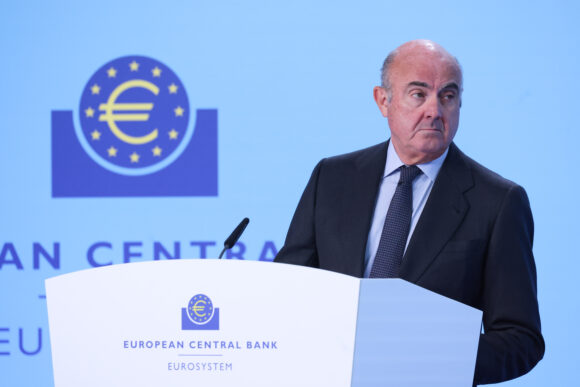European Central Bank Vice President Luis de Guindos said financial-stability risks are still high due to the unpredictable outlook for the global economy and trade.
“Vulnerabilities remain elevated in view of uncertainty over geoeconomic trends and the ultimate impact of tariffs in a volatile international environment,” Guindos said Monday in a speech in Frankfurt.
He listed “high valuations and concentration in financial markets, credit-risk exposures to tariff-sensitive firms and sovereign risk in some major advanced economies.”
Against this backdrop, Guindos said that maintaining the resilience of banks and the broader financial system is “crucial,” urging “a closer monitoring and strengthening the macro-prudential framework for the non-bank sector.”
The comments come before the ECB’s twice-yearly Financial Stability Review next week, which will assess rising threats to the banks that are the key source of funding for the region’s companies. Europe’s economy has so far held up surprisingly well to the threats Guindos cited, with the ECB not currently inclined to lower interest rates further.
Growth is turning out slightly better than anticipated, while inflation is still converging to the 2% target over the medium term, he said.
Central banks and financial watchdogs from across the world have recently cautioned about financial-stability risks such as stretched valuations for artificial intelligence firms, challenges to the Federal Reserve’s independence and the rapid rise of stablecoins.
The Bundesbank warned this month that geopolitical tensions, trade conflicts and rising public debt across Europe are weighing on the stability of Germany’s financial system, adding to risks of a sharp market downturn, with prices in equity and bond markets already “significantly elevated.”
The IMF last month also highlighted dangers from non-banks, arguing that traditional lenders could suffer a “significant” capital hit if cracks appear in these other parts of the system, including hedge funds and alternative asset managers.
Commenting separately on their national situations, the Netherlands and Ireland voiced similar concerns to Guindos.
“Global uncertainty has reached levels not seen in decades, spanning multiple domains,” the Dutch central bank said. “As a result, the probability of shocks to the economy and financial system remains elevated. The question is no longer whether such shocks will occur, but when and where.”
Irish central-bank Governor Gabriel Makhlouf, meanwhile, said uncertainty remains high, with the knock-on effects of new trading arrangements yet to become apparent.
“There is a continued disconnect between high levels of economic uncertainty and stretched market valuations as equity indices reach record highs, while corporate bond spreads are compressed,” he said. “A negative development in the outlook for US technology and artificial intelligent related companies could lead to a market correction.”
Photograph: Luis de Guindos, vice president of the European Central Bank (ECB), at a rates decision news conference in Frankfurt, Germany, on Thursday, Sept. 11, 2025. Photo credit: Alex Kraus/Bloomberg
Related:
- Global Funds Add to Warnings of Risks in Private Credit
- UBS Warns of Systemic Risk From Weak US Insurance Regulation
Topics Europe
Was this article valuable?
Here are more articles you may enjoy.



 Insurance Broker Stocks Sink as AI App Sparks Disruption Fears
Insurance Broker Stocks Sink as AI App Sparks Disruption Fears  Zurich Insurance Profit Beats Estimates as CEO Eyes Beazley
Zurich Insurance Profit Beats Estimates as CEO Eyes Beazley  Insurify Starts App With ChatGPT to Allow Consumers to Shop for Insurance
Insurify Starts App With ChatGPT to Allow Consumers to Shop for Insurance  Former Broker, Co-Defendant Sentenced to 20 Years in Fraudulent ACA Sign-Ups
Former Broker, Co-Defendant Sentenced to 20 Years in Fraudulent ACA Sign-Ups 

